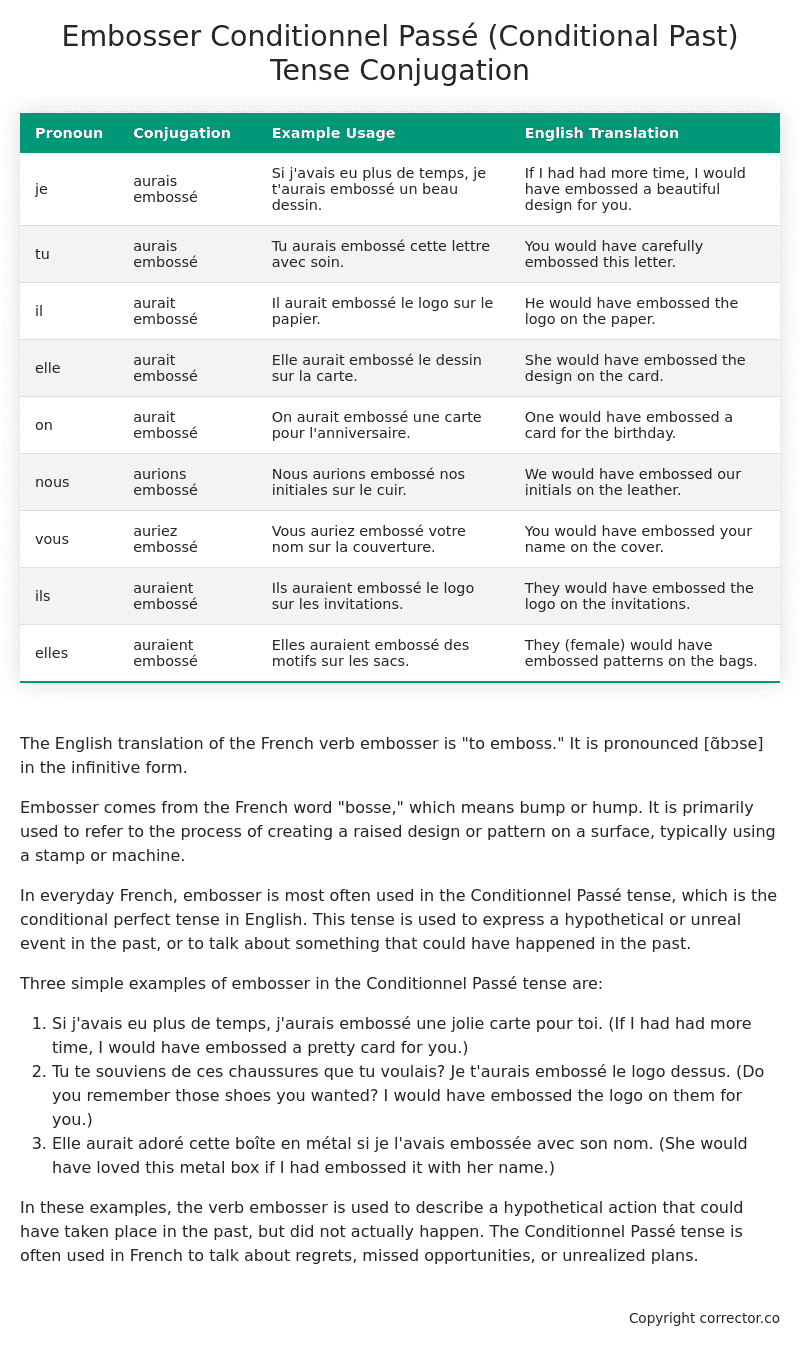Conditionnel Passé (Conditional Past) Tense Conjugation of the French Verb embosser
Introduction to the verb embosser
The English translation of the French verb embosser is “to emboss.” It is pronounced [ɑ̃bɔse] in the infinitive form.
Embosser comes from the French word “bosse,” which means bump or hump. It is primarily used to refer to the process of creating a raised design or pattern on a surface, typically using a stamp or machine.
In everyday French, embosser is most often used in the Conditionnel Passé tense, which is the conditional perfect tense in English. This tense is used to express a hypothetical or unreal event in the past, or to talk about something that could have happened in the past.
Three simple examples of embosser in the Conditionnel Passé tense are:
- Si j’avais eu plus de temps, j’aurais embossé une jolie carte pour toi. (If I had had more time, I would have embossed a pretty card for you.)
- Tu te souviens de ces chaussures que tu voulais? Je t’aurais embossé le logo dessus. (Do you remember those shoes you wanted? I would have embossed the logo on them for you.)
- Elle aurait adoré cette boîte en métal si je l’avais embossée avec son nom. (She would have loved this metal box if I had embossed it with her name.)
In these examples, the verb embosser is used to describe a hypothetical action that could have taken place in the past, but did not actually happen. The Conditionnel Passé tense is often used in French to talk about regrets, missed opportunities, or unrealized plans.
Table of the Conditionnel Passé (Conditional Past) Tense Conjugation of embosser
| Pronoun | Conjugation | Example Usage | English Translation |
|---|---|---|---|
| je | aurais embossé | Si j’avais eu plus de temps, je t’aurais embossé un beau dessin. | If I had had more time, I would have embossed a beautiful design for you. |
| tu | aurais embossé | Tu aurais embossé cette lettre avec soin. | You would have carefully embossed this letter. |
| il | aurait embossé | Il aurait embossé le logo sur le papier. | He would have embossed the logo on the paper. |
| elle | aurait embossé | Elle aurait embossé le dessin sur la carte. | She would have embossed the design on the card. |
| on | aurait embossé | On aurait embossé une carte pour l’anniversaire. | One would have embossed a card for the birthday. |
| nous | aurions embossé | Nous aurions embossé nos initiales sur le cuir. | We would have embossed our initials on the leather. |
| vous | auriez embossé | Vous auriez embossé votre nom sur la couverture. | You would have embossed your name on the cover. |
| ils | auraient embossé | Ils auraient embossé le logo sur les invitations. | They would have embossed the logo on the invitations. |
| elles | auraient embossé | Elles auraient embossé des motifs sur les sacs. | They (female) would have embossed patterns on the bags. |
Other Conjugations for Embosser.
Le Present (Present Tense) Conjugation of the French Verb embosser
Imparfait (Imperfect) Tense Conjugation of the French Verb embosser
Passé Simple (Simple Past) Tense Conjugation of the French Verb embosser
Passé Composé (Present Perfect) Tense Conjugation of the French Verb embosser
Futur Simple (Simple Future) Tense Conjugation of the French Verb embosser
Futur Proche (Near Future) Tense Conjugation of the French Verb embosser
Plus-que-parfait (Pluperfect) Tense Conjugation of the French Verb embosser
Passé Antérieur (Past Anterior) Tense Conjugation of the French Verb embosser
Futur Antérieur (Future Anterior) Tense Conjugation of the French Verb embosser
Subjonctif Présent (Subjunctive Present) Tense Conjugation of the French Verb embosser
Subjonctif Passé (Subjunctive Past) Tense Conjugation of the French Verb embosser
Subjonctif Imparfait (Subjunctive Imperfect) Tense Conjugation of the French Verb embosser
Subjonctif Plus-que-parfait (Subjunctive Pluperfect) Tense Conjugation of the French Verb embosser
Conditionnel Présent (Conditional Present) Tense Conjugation of the French Verb embosser
Conditionnel Passé (Conditional Past) Tense Conjugation of the French Verb embosser (this article)
L’impératif Présent (Imperative Present) Tense Conjugation of the French Verb embosser
L’infinitif Présent (Infinitive Present) Tense Conjugation of the French Verb embosser
Struggling with French verbs or the language in general? Why not use our free French Grammar Checker – no registration required!
Get a FREE Download Study Sheet of this Conjugation 🔥
Simply right click the image below, click “save image” and get your free reference for the embosser Conditionnel Passé tense conjugation!

Embosser – About the French Conditionnel Passé (Conditional Past) Tense
Formation
Common Everyday Usage Patterns
Expressing Unreal Past Scenarios
Polite Requests or Suggestions
Expressing Doubt or Uncertainty
Interactions with Other Tenses
Conditional Present
Indicative Past Tenses
Conditional Future
Summary
Want More?
I hope you enjoyed this article on the verb embosser. Still in a learning mood? Check out another TOTALLY random French verb conjugation!


